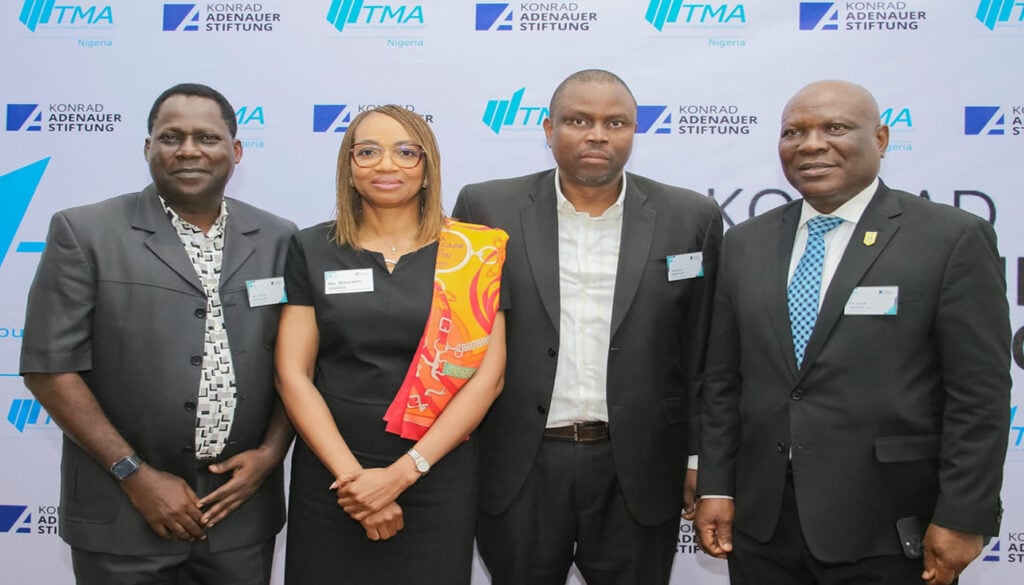Experts have urged both the government and private sector players to embrace turnaround management as a key tool for reviving moribund assets and driving Nigeria’s economic recovery.
This call was made during the 2025 Annual Conference of the Turnaround Management Association (TMA) Nigeria, held in Lagos in partnership with the Konrad Adenauer Stiftung. The two-day conference, which ended on Saturday, had as its theme “Reviving Moribund Assets – The Role of Turnaround Management in Nigeria’s Economic Recovery Strategy.”
The event brought together turnaround management professionals, banking representatives, SME stakeholders, policymakers, and development partners to discuss how strategic corporate renewal could restore productivity and stimulate growth in distressed sectors of the economy.
In her opening remarks, the Executive Secretary of TMA-Nigeria, Mrs. Cynthia Ofodile, said the association’s mission is to promote the profession of corporate renewal and change management across Nigeria. She emphasised the need for partnership and shared vision in achieving sustainable recovery.
“We recognise that sustainable recovery can only be achieved through partnership and shared vision,” Ofodile said. “Together, we can redefine the future of corporate renewal in Nigeria, and together, we can turn setbacks into success stories.”
The President of TMA-Nigeria, Dr. Steve Ogidan, stressed that turnaround management should be seen not just as a crisis solution but as a strategic instrument for national prosperity.
“In an era characterised by global disruptions and domestic economic uncertainty, turnaround management emerges as more than a rescue tool. It is a strategic imperative for national development,” Ogidan said. “When properly implemented, it can revive distressed but viable enterprises, preserve jobs, strengthen supply chains, and create new growth opportunities.”
Dr. Ogidan added that turnaround management is not just a business skill but “a mindset, a capability, and a pathway to prosperity.”
During a panel session titled “Reviving Moribund Assets for Economic Growth: The Role of Turnaround Management,” the Vice President (North) of TMA-Nigeria, Mr. Adamu Gambo, highlighted that Nigeria’s industrial capacity utilisation currently stands at about 55 per cent. He cited a Bank of Industry estimate showing that the manufacturing sector holds over ₦2 trillion worth of non-performing assets.
“These are not just figures,” Gambo said. “They represent silent factories, idle warehouses, and communities left without economic activity. But within this challenge lies a huge opportunity. If we can revive even 20 per cent of these assets, we can create hundreds of thousands of jobs and strengthen our industrial base.”
Also speaking at the session, the Chief Executive Officer of Quick Projects Ltd., Dr. Victor Dickson, identified weak managerial capacity as one of the major causes of industrial collapse in Nigeria. He stressed that access to finance alone cannot ensure business success.
“Many businesses think capital is their main problem,” Dickson said. “But in reality, the biggest issue is poor management. A turnaround expert must assess both technical capacity and leadership strength before any sustainable recovery can occur.”
The Chief Executive Officer of Fingertips Enterprise Development Partners Ltd., Dr. Haggai Gutap, also spoke at the event, linking the high rate of non-performing loans among small businesses to poor financial literacy and a culture of dependency on government funds.
“Many SMEs treat intervention funds like free money,” he said. “Without proper business education and mentorship, even the best funding models will fail.”
Similarly, the Managing Partner at A2 Consulting, Dr. Naomi Omoduemuke, identified cultural attitudes among entrepreneurs as a barrier to long-term business sustainability.
“If you fill critical roles in your business with unqualified relatives, it will eventually fail,” she said. “Entrepreneurs must adopt forward-thinking strategies, embrace technology, and seek professional advice early.”
The second day of the conference featured a keynote address by Prof. Adetunji Ogunyemi, a lawyer and professor of Economic History at Obafemi Awolowo University, Ile-Ife. His presentation, titled “When Turnaround Maintenance Fails: What Should Government Do?” explored legal and institutional solutions for failed public projects.
Ogunyemi identified four legal remedies that can be applied when turnaround efforts collapse — contractual remedies, institutional and statutory remedies, litigation, and mediation through Alternative Dispute Resolution (ADR) under the Arbitration and Mediation Act of 2023.
“The best institution to approach in matters involving public finance or contracts is the court,” Ogunyemi stated. “When government projects fail, legal enforcement helps establish accountability and prevent future waste.”
He concluded by urging the government to consistently enforce these legal remedies to restore public confidence. “When government applies these remedies firmly, contractors will sit up, and taxpayers’ money will no longer be wasted,” he said.
The conference ended with a consensus among participants that turnaround management should become a national priority to rescue failing industries, create jobs, and reposition Nigeria’s economy for sustainable growth.
